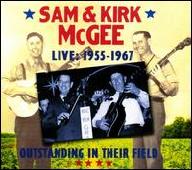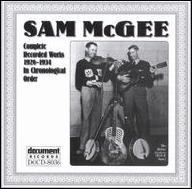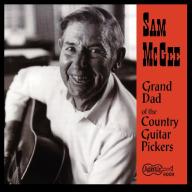In 1925, Sam began a longtime affiliation with Uncle Dave Macon, who would become his mentor and occasional rival. It was with Macon that Sam made his recording debut on guitar instrumentals like "Buck Dancer's Choice" and "Knoxville Blues." Two years later, Kirk also joined Macon's band, the Fruit Jar Drinkers, and recorded with them in New York. Around this time, the brothers also began recording their own songs; in 1928, Kirk and his cousin Blythe Poteet cut a few singles for Gennett, including the popular "Kicking Mule," and also performed on the Grand Ole Opry with Macon. In 1931, the brothers began working with fiddler Arthur Smith as the Dixieliners, becoming one of the most popular string bands during the 1930s. Although they played during most of Smith's live performances, the McGees never recorded with him.
The brothers abandoned country music for a time during the 1940s. Later, Kirk began his decade-long intermittent association with Bill Monroe. By 1955, the McGees were in danger of losing their tenure at the Opry and were told to resume touring. The following year, they staged a comeback, entertaining a new generation of folk music lovers. The brothers reunited with Smith in 1957 and recorded two albums for Folkways, also playing northern folk festivals. The McGees began to specialize in old-time music during the '60s. They recorded together and separately on a variety of independent labels before forming their own record company, MBA, in the early 1970s. They played their final engagement at the old Ryman Auditorium, the original home of the Opry, in 1974; by that time they were the senior members of the show and were honored by being the first act to play at the new Opry house. One year later, Sam was killed in a farming accident. Kirk kept on playing alone and with the Fruit Jar Drinkers. ~ Sandra Brennan, Rovi















